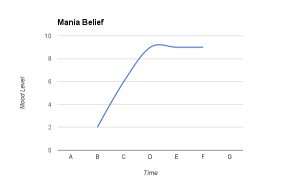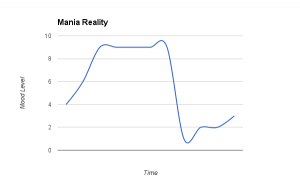Author’s Note and Trigger Warning: The following post discusses Suicide and heavy subjects related to mental illness. Please make sure you’re in a comfortable mental space before continuing. This post was written with the assistance and approval of surviving family members. Names and certain details have been changed to protect the privacy and anonymity of those involved.
I met Brittney and her husband David in the spring of 2010. She was an assistant facilitator of a mood disorder support group that I decided to attend when I was just starting on my recovery path. I became friends with her and her husband, exchanging the periodic email and catching up every once awhile. A few months ago, I got a different kind of email from David, informing me that Brittney had completed suicide earlier this year. She was in her mid forties.
Brittney’s life wasn’t easy. She was born into an abusive family and eventually taken away by Children’s Services before she turned 10 years old. She never knew her father and her mother died of a heroin overdose before reaching her teens. Brittney was adopted and mostly raised by her grandparents who struggled to contain her rebellious, impulsive streak. Her grandmother describes her as too smart and sarcastic for her own good, even at a young age.
At about 19 years old, she was diagnosed with Bipolar Disorder and promptly rejected her diagnosis. She refused therapy, medication, or to acknowledge that it could be a possibility. It wasn’t until her late 20s that she finally acknowledged her diagnosis after a psychotic episode hospitalized her. By then, she was also self-medicating, struggling with a heroin addiction and alcoholism. Brittney went through rehab multiple times before she started to really embrace trying to understand herself, her mental illness, and how it had affected her life to that point.
It took a couple years but she eventually found a combination of medications that worked for her. She started attending therapy to sort through her emotional baggage. With her new-found stability, she rekindled her on again, off again relationship with her high school sweetheart David and went to college. She completed undergrad, and then went off to grad school where she earned a Master’s in Business Administration, a goal she never thought she would attain. Though she didn’t particularly love her job in middle management, she was generally happy with her life and proud of what she had accomplished.
About a year ago, she started getting interested in the multi-level marketing companies that her girlfriends were getting involved in, particularly essential oils. David related that she hated feeling enslaved to psych medications to be functional and normal. She spent a lot of time reading and relaying information about essential oils and the evils of Big Pharma, particularly the toxins that she was afraid of going into her body because of her psych medication.
Brittney clashed with her family over her desire to quit her medication, all the while being encouraged to quit her meds and detox by the natural living and “Wellness Advocates” she had surrounded herself with. She eventually accused her family of being abusive and controlling, not wanting her “to be happy and live her best life.” Her words, according to her grandmother.
As far as David can tell, that’s about the same time she quit all of her medication and refused to see her doctor or therapist anymore. She insisted they were bought and paid for by Big Pharma.
David relates that she went from relatively stable to paranoid, chaotic, and violent within just a few weeks. She quit her job, maxed out her credit cards, and spent their savings on joining and buying thousands of dollars of product from two different multi-level marketing companies.
She was hospitalized not long after, where she would be in-patient for several weeks. Eventually, she was deemed stable enough to be discharged and went home to her family.
Brittney completed suicide not even a week later. She was found by her eight year old daughter.
Ladies and gentlemen – every single day you are influenced, lied to, and manipulated by advertisers and people pushing an agenda. The various entities that embody a “wellness industry” that sits outside of regulation and certification is no different. It is absolutely true that essential oils can have reasonable uses for a number of minor maladies or problems. However, it is also absolutely true that companies and advertisers use words as weapons to manipulate those who don’t know any better into thinking their products will deliver some holy grail results that the medical industry just can’t or won’t.
Detoxification is a widely exploited myth. Your body naturally detoxifies itself on a 24/7 basis. And for those of us that are taking serious psych meds, we are generally getting regular bloodwork and testing done to ensure that they are not shutting down organs or reaching toxic levels.
Detox is wielded as an ambiguous buzzword that does not have a concrete, consistent definition from “wellness company” to “wellness company.” In the actual practice of medicine, a medical detox is weaning someone off of a controlled substance like alcohol or heroin, where withdrawal can harm or kill the person.
“But I’ve detoxed before and it really made me feel so much better! I really believe in it!” Great. Believe whatever you want to believe, but you still never tell anyone else to quit taking their medication. That’s not for you to do.
“But Big Pharma is evil! They only care about money!” This is a more difficult and nuanced perspective. I’ve met way too many professionals that do not understand the fear and mistrust that exists on the consumer side – fear and mistrust that drives decisions like Brittney’s. I don’t implicitly trust the mental health industry either. Like anything involving humanity, there’s going to be some shadiness to it somewhere. That’s just how it is, but that’s no reason to throw it all away either. If you throw away everything shady that humanity touches, there would be nothing left.
“Why don’t people trust science? Why don’t people trust doctors?” Because those industries do a piss-poor job of conveying the complexity and difficulty of it all, though I’m not confident that people would actually listen if they did focus more on public relations.
Hell, look at the prevalence of Type 2 Diabetes, which could be curbed if we just stopped shoveling garbage and sugar into our mouths on a constant basis, but we don’t even bother to do that for the most part. And no judgment, I’m just as guilty of eating a garbage diet for most of my life.
Be that as it may, you still have advertisers and executives pushing their agendas to sell more drugs and increase their profits. And we shouldn’t forget the illustrious insurance companies who don’t even seem to view us as people at times.
“But you should trust your doctor!” Yeah, we should. We should be able to trust our doctors. Doctors that told us tobacco wasn’t harmful, that handed out opioids and psych meds like candy. And of course, the humane and compassionate way the mentally ill have been treated throughout the years. I’d like to be able to trust my doctor wholly and completely, but I don’t, because they are fallible human beings.
Do you know who I trust even less than that? People who offer something for nothing.
“Essential oils can help lift your moods and may help with anxiety and depression! No side effects!” The problem with that statement is that it is disingenuous. Different people read words like mood disorder, anxiety, and depression in different ways. And mentally ill people tend to forget that words like bipolar, anxiety, and depression have other definitions that do not have to be referring to an actual diagnosed disorder. Anxiety can mean general fear and discomfort. Depression can mean general negativity and being down. They don’t necessarily mean mental illness – but that’s not how mentally ill people hear those words.
And the dishonest essential oil companies, the one peddling their wares as cure-alls with minimal side effects, exploit that perception by writing their marketing and recruiting materials in such a way that allows you to come to that conclusion on your own without needing to assert it, standing in a nebulous gray area that’s going to take new legislation to fix. But even then, it’ll barely matter. They’ll do the same thing they did when pyramid schemes were made illegal. They’ll hire a team of lawyers to interpret the new legislation, restructure, and rewrite their materials to skirt the law and take advantage of the unaware.
“But essential oils really helped me!” Great. You still do not tell other people to quit taking their psych meds. That’s not for you to do.
And if you do want to incorporate some natural methods into your mental health management, you need to discuss it with your prescribing doctor. Double-checking with your pharmacist to make sure there won’t be any conflicts is also a good idea. “Natural” and “pure” are common advertising buzzwords that sound good but essentially mean nothing. Cyanide is natural and pure.
A pharmacist is the person who will be most knowledgeable on those interactions. Their knowledge is much deeper than counting pills and putting them in a bottle for you.
And finally, if you are a person who either sells or is interested in selling “wellness products”, essential oils, or other “natural remedies” – this isn’t a fucking game. People suffer and die.
People like Brittney, who spent over a decade well and sober, who died alone by her own hand. People like her daughter, who goes to therapy every week to deal with the PTSD from finding her mother. People like her other children, who now get to grow up without their mother. People like her husband, who is now raising their kids alone and misses her every day. People like her grandmother, who have been with her from the beginning, who struggled and sacrificed to try and help her when she wasn’t ready to help herself. People like her friends who will mourn her. And the people that she touched and helped on their own paths who will mourn her.
And for what? Not thinking past a few lousy dollars because some dick in a suit with a bright smile sells people on the idea that they are improving health, offering hope and wellness in lieu of the big bad Big Pharma and “evil” medical industry.
Essential oils may be able to temporarily improve your mood, but they are no substitute for psych medication. They will not control or cure any mood disorder or mental illness. They cannot and should not be used to treat any mental illness or mood disorder, despite what their marketing materials insinuate and “Wellness Advocates” may claim. Always take your medication as directed. If you want to quit or change it, talk to your prescribing professional first.
And always remember, if you have Bipolar Disorder and you are doing well on medication, it’s because of the medication! Don’t stop taking it. Bipolar Disorder is for life. The reality that we need to accept is that medication is the difference between life and death for a lot of us. That’s just the way it is and the reality we have to accept.
Rest in peace, Brittney.
You can also find me on Facebook or Twitter.
Facebook: www.facebook.com/YourBipolarFriend
Twitter: www.twitter.com/BipolarFriend22




